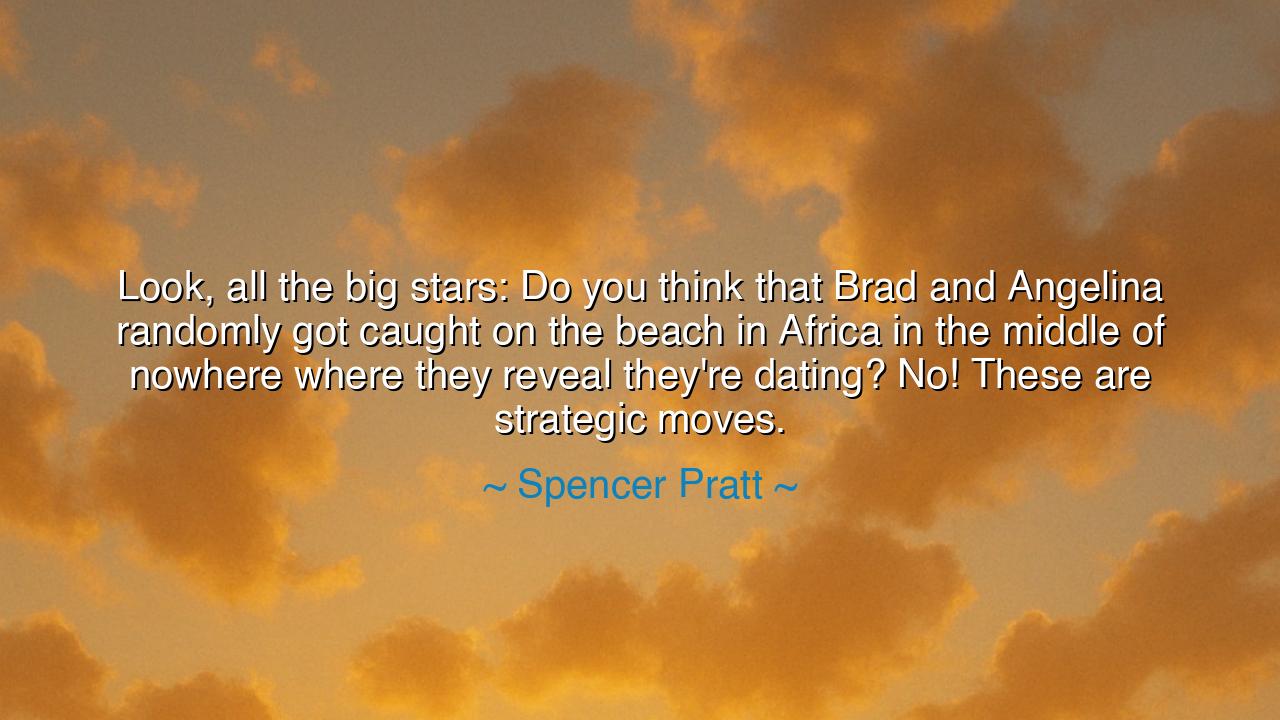
Look, all the big stars: Do you think that Brad and Angelina
Look, all the big stars: Do you think that Brad and Angelina randomly got caught on the beach in Africa in the middle of nowhere where they reveal they're dating? No! These are strategic moves.






In the theater of modern fame, where light and shadow mingle with equal cunning, Spencer Pratt, ever the student of spectacle, once declared: “Look, all the big stars: Do you think that Brad and Angelina randomly got caught on the beach in Africa in the middle of nowhere where they reveal they're dating? No! These are strategic moves.” Though spoken in the language of celebrity and tabloids, his words conceal a truth that stretches beyond gossip — a truth as old as politics, empire, and art: that image is power, and that the stories the world believes are seldom born of chance.
In this statement, Pratt lifts the veil from the illusion of spontaneity. He reminds us that in the age of constant visibility, nothing is truly accidental. The “big stars”, as he calls them, are not merely creatures of talent or destiny, but of deliberate craft — architects of their own myth. The image of Brad and Angelina “caught on a beach” is not a coincidence but a symbol, a modern ritual designed to enchant the public mind. Their love story, carefully unveiled, became not just news but legend — a tale whispered across continents, shaping their fame as much as their art ever did. In truth, the ancients knew this well: for what are gods, kings, or heroes, if not the carefully sculpted myths of their own making?
In ancient Rome, the same game was played, though with laurel instead of lens. Julius Caesar, returning from conquest, paraded his victories through the streets not merely to inform but to perform. Every march, every speech, every gesture was strategic — an act of storytelling to shape how history would remember him. When he crossed the Rubicon, it was not only an act of war but of theater; he knew the gesture would echo through eternity. So too, in Pratt’s observation, do the stars of our age craft their Rubicons — those staged moments where personal life becomes public mythology, where choice masquerades as chance, and destiny is written not in the stars, but by them.
What Spencer Pratt reveals, though wrapped in the language of entertainment, is a lesson in perception and intention. He speaks of a world where authenticity and strategy are twins, forever intertwined. The wise do not dismiss this as deceit, but recognize it as art — the art of understanding how the world sees. To pretend that greatness alone commands attention is folly; history itself bows to the skilled storyteller. Whether through the poetry of Homer or the photographs of Hollywood, it is not the act alone, but its framing, that endures.
Yet within this truth lies both danger and wisdom. For while strategy can elevate, it can also ensnare. The one who lives too long behind a crafted image risks losing sight of the soul beneath it. The ancients warned of this when they told of Narcissus, who fell in love with his reflection — a myth not of vanity alone, but of self-deception. The public image, if mistaken for the self, becomes a prison of mirrors. To master the art of perception, one must never forget the heart behind the performance. Pratt’s insight, then, is not an invitation to manipulation, but a reminder of awareness: know the power of the story you tell, but do not be consumed by it.
In this light, his quote becomes almost prophetic. For though it speaks of celebrities, it mirrors the condition of all people in the digital age. Each of us, in our own way, curates our image — the moments we share, the truths we emphasize, the faces we show to the world. We are all, to some degree, participants in this theater of life. The difference between the wise and the unaware lies not in whether they craft an image, but whether they do so consciously. To live strategically is not to live falsely; it is to live intentionally, with understanding of how the world perceives and how truth must sometimes wear the mask of art.
So, take this teaching to heart: your life is both reality and performance. The way you present yourself — in love, in work, in friendship — shapes how the world responds to you. Do not act blindly or live without reflection. Be authentic, yes, but also deliberate. Know when to speak and when to remain silent, when to reveal and when to conceal. For as Spencer Pratt reminds us, the great figures of every age — from Caesar to cinema — have known that destiny is rarely found; it is staged, step by step, moment by moment.
And remember this final truth: strategy without integrity is manipulation, but strategy with purpose is wisdom. The art lies not in deception, but in the harmony between image and essence. Let your life be both true and intentional — a story worth being seen, and a soul worth being known. For even in an age of spectacle, authenticity remains the most radiant performance of all.






AAdministratorAdministrator
Welcome, honored guests. Please leave a comment, we will respond soon